Daily Vocabulary Words: Enhance Your Lexicon with Leading Newspapers & Publications
Welcome to the Daily Vocabulary section at Wordpandit!
Our mission is straightforward: to bring you essential vocabulary words featured in top newspapers and publications worldwide. By focusing on words you’ll encounter in renowned sources, we aim to help you enhance your vocabulary effectively and practically.
Our selection includes words from:
– The New York Times
– The Washington Post
– Scientific American
– BBC
– The Guardian
– Psychology Today
– Wall Street Journal
– The Economist
– The Hindu
– The Times of India
– The Economic Times
– Hindustan Times
– Live Mint
– The Indian Express
– And many more.
We are committed to your vocabulary development. Simply visit this section regularly and explore the daily posts. This is your go-to repository for commonly used words, providing significant practical benefits by familiarizing you with vocabulary from the leading publications listed above.
Make it a habit to visit our website daily and expand your lexicon with words from top newspapers and publications. (edited)
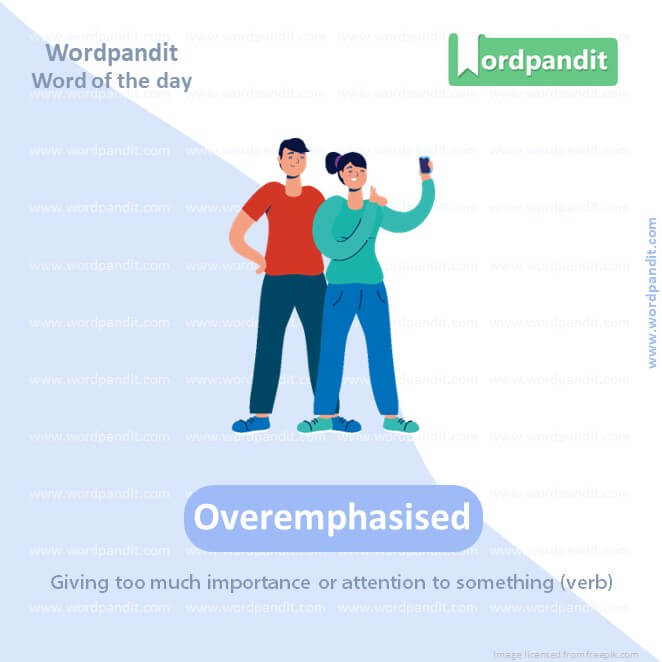
WORD-1: Overemphasised
CONTEXT: In Viksit Bharat, economic development is overemphasised. But post-developmentalists argue that this is a Euro-centric notion of development which reflects the interests of its practitioners.
SOURCE: The Hindu
EXPLANATORY PARAGRAPH: Imagine if you keep talking and talking about how amazing your new toy is, even when it’s just a regular toy. “Overemphasised” means talking about something way more than it really needs to be talked about.
MEANING: Giving too much importance or attention to something (verb)
PRONUNCIATION: oh-ver-EM-fuh-sized
SYNONYMS: Exaggerated, overstated, inflated, overstressed, magnified, highlighted
USAGE EXAMPLES:
1. The benefits of the new product were overemphasised in the advertisement.
2. She felt her achievements were overemphasised at the party.
3. The report overemphasised the risks involved.
4. His skills were overemphasised in the job interview.
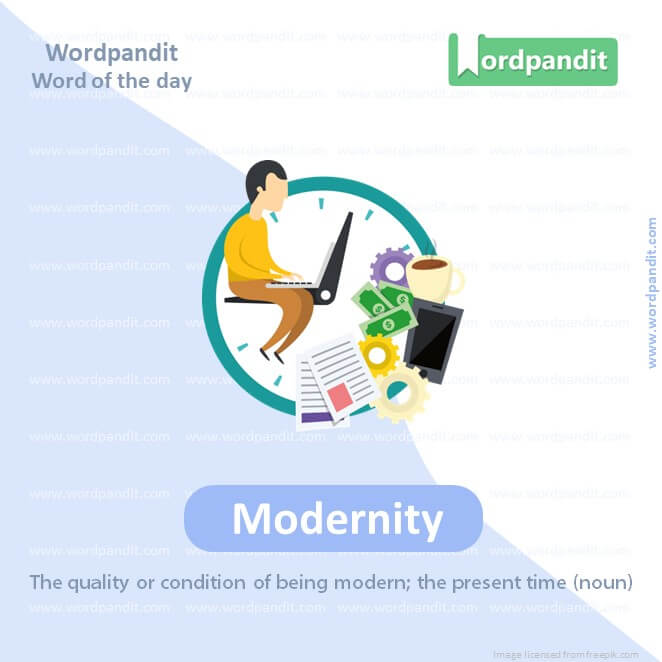
WORD-2: Modernity
CONTEXT: Critics of development have consistently raised concerns about the conventional models of economic growth, challenging the contentious notions surrounding modernity and progress.
SOURCE: The Hindu
EXPLANATORY PARAGRAPH: Imagine wearing the latest clothes and using the newest gadgets. “Modernity” means having or using the latest and newest things.
MEANING: The quality or condition of being modern; the present time (noun)
PRONUNCIATION: mod-UR-nuh-tee
SYNONYMS: Innovation, contemporary style, progressiveness, newness, current trends, advancement, modernism
USAGE EXAMPLES:
1. The city is known for its modernity and technological advancements.
2. The design of the building reflects modernity.
3. He appreciates the modernity in contemporary art.
4. Modernity often involves embracing new technologies and ideas.
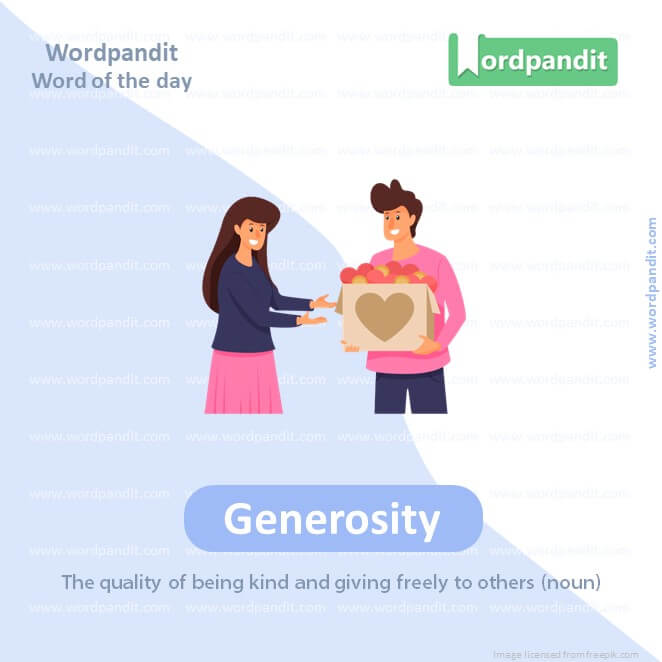
WORD-3: Generosity
CONTEXT: The happiness matrix includes six variables: GDP per capita; healthy life expectancy at birth; generosity; social support; freedom to make life choices, and perception of corruption.
SOURCE: The Hindu
EXPLANATORY PARAGRAPH: Imagine sharing your favorite toys with your friends, even when you really like them. “Generosity” means being kind and giving to others, even if it means giving up something you like.
MEANING: The quality of being kind and giving freely to others (noun)
PRONUNCIATION: jen-uh-ROS-i-tee
SYNONYMS: Kindness, benevolence, philanthropy, charity, sharing, liberality, altruism
USAGE EXAMPLES:
1. Her generosity was shown when she donated her toys to charity.
2. The generosity of the community helped build a new playground.
3. He was praised for his generosity towards his colleagues.
4. Generosity often brings people closer together.
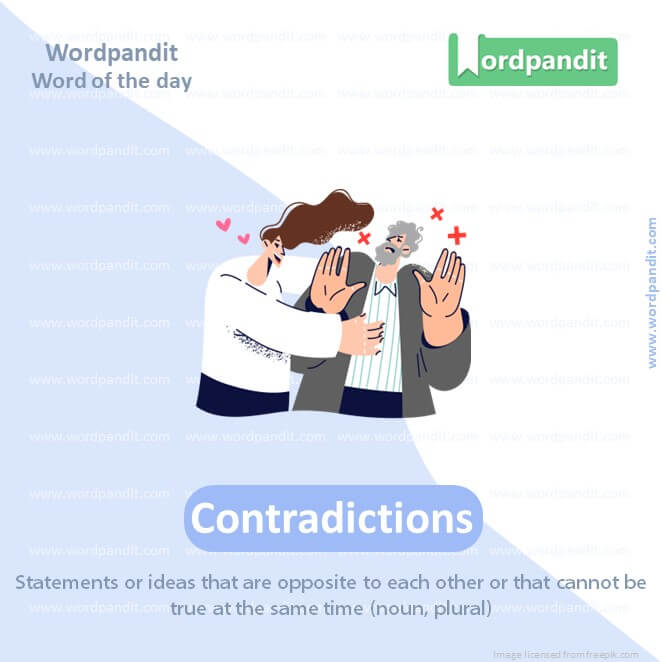
WORD-4: Contradictions
CONTEXT: All aspects of life in this development cycle do not change simultaneously, creating imbalances and contradictions.
SOURCE: The Hindu
EXPLANATORY PARAGRAPH: Imagine if one friend says it’s sunny outside and another friend says it’s raining. “Contradictions” happen when two things don’t agree with each other and are opposite.
MEANING: Statements or ideas that are opposite to each other or that cannot be true at the same time (noun, plural)
PRONUNCIATION: kon-truh-DIK-shuns
SYNONYMS: Inconsistencies, discrepancies, conflicts, oppositions, disagreements, variances
USAGE EXAMPLES:
1. There were many contradictions in the witness’s statements.
2. The report contained several contradictions that confused the readers.
3. Contradictions in the evidence led to further investigation.
4. The book had contradictions that made it hard to follow.
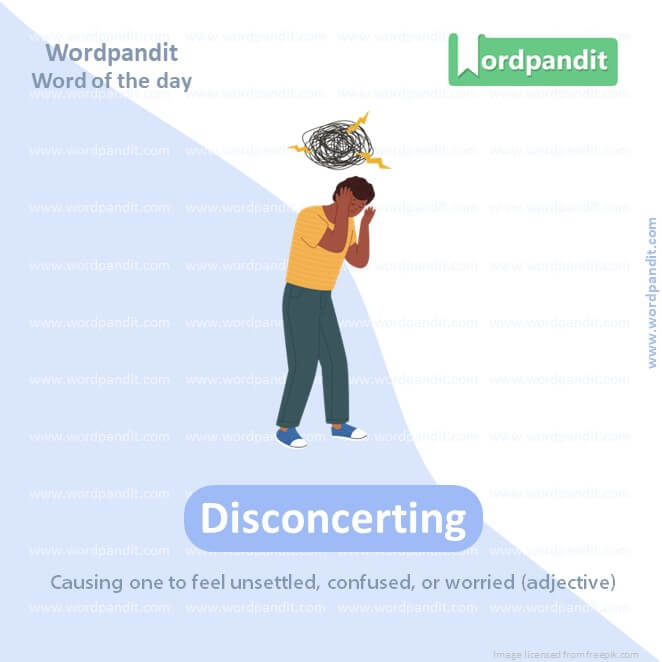
WORD-5: Disconcerting
CONTEXT: What is even more disconcerting is that the victims ranged from a 13-year-old to middle-aged individuals, dispelling the myth that heart-related issues primarily afflict the elderly.
SOURCE: The Hindu
EXPLANATORY PARAGRAPH: Imagine you hear a strange noise in the middle of the night, and it makes you feel scared or worried. “Disconcerting” means something that makes you feel uneasy or unsettled.
MEANING: Causing one to feel unsettled, confused, or worried (Adjective)
PRONUNCIATION: dis-kon-SUR-ting
SYNONYMS: Unsettling, alarming, troubling, disturbing, confusing, perplexing, worrisome
USAGE EXAMPLES:
1. The sudden change in plans was disconcerting to everyone.
2. She found the news to be disconcerting.
3. His disconcerting behavior made the others uncomfortable.
4. The unexpected silence was disconcerting during the meeting.
WORD-6: Predisposition
CONTEXT: This epidemic is further spurred by factors including a genetic predisposition towards conditions such as diabetes and heart disease, and a sedentary lifestyle, which also brings with it issues such as stress, anxiety, and depression.
SOURCE: The Hindu
EXPLANATORY PARAGRAPH: Imagine you always like the same kind of ice cream more than others. “Predisposition” means having a natural tendency or liking for something.
MEANING: A natural tendency or inclination towards something (noun).
PRONUNCIATION: pree-dis-puh-ZISH-un
SYNONYMS: Tendency, inclination, susceptibility, propensity, bias
USAGE EXAMPLES:
1. His predisposition towards math made him excel in the subject.
2. There may be a genetic predisposition to certain health conditions.
3. Her predisposition for helping others was evident in her volunteer work.
4. The study looked at how predispositions affect behavior.
WORD-7: Proactive
CONTEXT: We need to change our attitude from ‘it’s better not to know’ to ‘it’s best for me to be proactive so that I can overcome it’.
SOURCE: The Hindu
EXPLANATORY PARAGRAPH: Imagine you clean your room before your parents even ask you to. “Proactive” means taking action before problems happen, rather than waiting for things to go wrong.
MEANING: Taking action in advance to prevent problems (adjective).
PRONUNCIATION: proh-AK-tiv
SYNONYMS: Anticipatory, preventative, forward-thinking, active, preemptive, enterprising, dynamic
USAGE EXAMPLES:
1. She took a proactive approach to solve the issues before they became big problems.
2. Being proactive in your studies helps you stay ahead.
3. The company’s proactive measures improved its performance.
4. A proactive attitude often leads to better results.
WORD-8: Embracing
CONTEXT: By embracing sustainable healthy habits today, we commit to making healthier choices for 365 days and beyond.
SOURCE: The Hindu
EXPLANATORY PARAGRAPH: Imagine giving a big hug to a new friend and being happy about them. “Embracing” means accepting and being enthusiastic about something new or different.
MEANING: Accepting or taking in something eagerly (verb, present participle).
PRONUNCIATION: em-BRAY-sing
SYNONYMS: Accepting, welcoming, adopting, supporting, including, taking on, hugging
USAGE EXAMPLES:
1. She is embracing the new changes at work.
2. The community is embracing new technology.
3. He found joy in embracing different cultures.
4. Embracing challenges can lead to personal growth.
WORD-9: Resonating
CONTEXT: It is a call-to-action resonating with the belief that the strength of a nation is rooted in the
vitality of its people.
SOURCE: The Hindu
EXPLANATORY PARAGRAPH: Imagine when you hear a beautiful song, and it makes you feel happy inside. “Resonating” means something that connects with you deeply or feels meaningful.
MEANING: Producing a strong, positive feeling or effect (verb, present participle).
PRONUNCIATION: REH-zuh-nay-ting
SYNONYMS: Echoing, reverberating, resounding, affecting, striking, touching, meaningful
USAGE EXAMPLES:
1. The speaker’s words were resonating with the audience.
2. The music was resonating through the hall.
3. His story resonated with many people in the room.
4. The message of the campaign is resonating with the public.
WORD-10: Abrogation
CONTEXT: The appointment of the Chief Election Commissioner; and three, by completely displacing rules, such as in the abrogation of Article 370 (in Jammu and Kashmir).
SOURCE: The Hindu
EXPLANATORY PARAGRAPH: Imagine if a rule that was once important is suddenly erased and no longer used. “Abrogation” means canceling or getting rid of a rule or law.
MEANING: The act of canceling or abolishing something, especially a law (noun).
PRONUNCIATION: ab-roh-GAY-shun
SYNONYMS: Cancellation, abolition, annulment, repeal, revocation, termination, invalidation
USAGE EXAMPLES:
1. The abrogation of the old law was announced last week.
2. They debated the abrogation of the outdated regulations.
3. The treaty’s abrogation led to new negotiations.
4. The sudden abrogation of policies caused confusion.
Vocabulary Daily Use
In the fascinating world of language learning, we often concentrate on taking giant leaps, but the real magic lies in the small steps of ‘vocabulary daily use’. These frequently used words and phrases form the backbone of practical communication and understanding. Therefore, mastering ‘vocabulary daily use’ is a crucial element in achieving language fluency.
To effectively learn ‘vocabulary daily use’, one needs to venture beyond the traditional textbook resources. The real essence of these words unveils itself in everyday exposure and interactions. Engaging with a variety of material like novels, magazines, newspapers, podcasts, films and digital content deepens the understanding of ‘vocabulary daily use’. Immersion in these contexts yield natural, everyday language that bridges the gap between the classroom and the real world.
The journey of mastering ‘vocabulary daily use’ necessitates the integration of innovative memory techniques. Flashcards and the Leitner System aid in embedding these words into your long-term memory by promoting active recall. Additionally, the use of mnemonic devices, which allow you to associate ‘vocabulary daily use’ with personal and familiar narratives, can enhance your ability to remember and recall these words.
Moreover, it’s important to remember that ‘vocabulary daily use’ isn’t just about comprehension- it’s about practice and active usage. Incorporate these words in your day-to-day communication and social interactions. This not only solidifies your understanding but also accelerates learning and internalization of ‘vocabulary daily use’.
In a nutshell, mastering ‘vocabulary daily use’ is a continual process that demands exposure, creative learning strategies and assertive practice. The commingling of these tactics brews the perfect formula that allows learners to seamlessly integrate ‘vocabulary daily use’ into their linguistic repertoire. And with that, they can navigate the nuances of language with confidence and ease.













